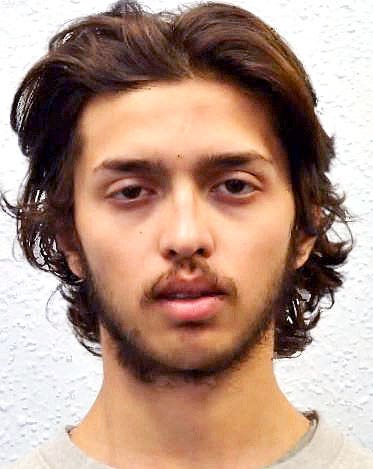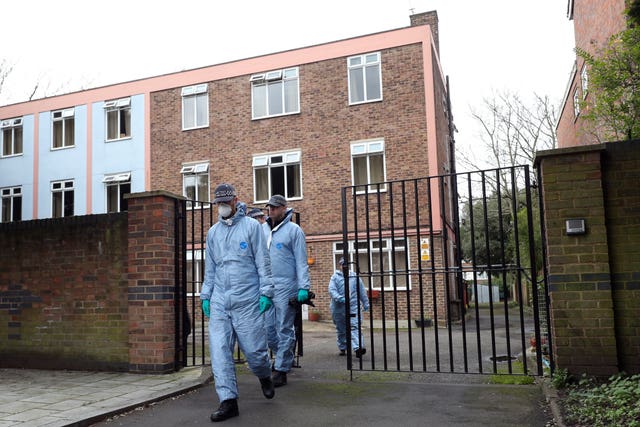The father of the Streatham terror attacker has said he never thought his son “would go this far” and he did not know he had become radicalised.
Faraz Khan said Sudesh Amman was reciting the Koran when they last spoke, a day before the attack.
The 20-year-old was shot dead by police on Sunday after grabbing a knife from a shop and attacking two bystanders in Streatham High Road, south London. A third person was injured by flying glass during the gunfire.

He had been staying at a nearby bail hostel, while under 24-hour police surveillance.
Security services regarded him as an “extremely concerning individual”, a source told the PA news agency.
While in Belmarsh high-security prison, Amman reportedly told a fellow inmate that he wanted to murder an MP and copy the killing of Jo Cox, according to the Times.
Mr Khan, who left the UK for Sri Lanka three months ago, told Sky News: “I spoke to Sudesh one day before he passed away. I didn’t know he had become radicalised.
“He was reciting the Koran to me and he was translating that to me.
“He’s never spoken to me about these kind of things.

“I heard they found a lot of things and I saw them on the news, but I never thought he would go this far.”
His comments came as one of the victims was named in reports as teacher Monika Luftner.
In a statement, St Bede’s Catholic Infant & Nursery School in Lambeth said a member of staff was making a “good recovery after experiencing a shocking attack”.
Meanwhile, the Government is pressing ahead with plans for emergency laws to keep terrorists behind bars for longer by ending automatic release halfway through a sentence.
There are 224 terrorists in prison in Great Britain, with most thought to be holding Islamist-extremist views, according to the latest published figures to the end of September.
As many as 50 terrorists could be freed from jail this year, figures suggest.
Among those thought to be due for release this year is radicalised chemistry teacher Jamshed Javeed, according to think-tank the Henry Jackson Society (HJS).
He was jailed for six years in March 2015 for planning to travel from his Manchester home to Syria to join IS.
The new law is expected to be passed by the time Parliament goes into recess on February 13, despite warnings that this could prompt legal challenges from those already serving sentences set under previous rules.
Senior Cabinet minister and former justice secretary Michael Gove told Sky News that terrorists should be imprisoned indefinitely “if necessary”.
However, Downing Street acknowledged that there was nothing to prevent prisoners being automatically released until the emergency law is passed.
Prime Minister Boris Johnson’s official spokesman would not say if any terrorists were due for release before the new law comes in.
The Government did not rule out derogating – effectively suspending – the European Convention on Human Rights (ECHR) in order to apply the new measures.
The spokesman said: “We are going to ensure that we will bring forward the necessary legislation to protect the public because that’s the right thing to do.”
When asked if the Government remained committed to upholding the ECHR, the spokesman added: “We are signatories to the ECHR.”

Home Office data shows 41 convicted terrorists were released from jail in the year to June, as well as 12 suspects who had been held in custody but not sentenced.
Among those due for release, according to the HJS, is Mohammed Ghani, who was sentenced to two years and four months in May last year after threatening to kill police officers, and Britain’s youngest terrorist, a boy known only as RXG, who plotted to murder police officers in Australia.
Also on the list are those who aspired to or travelled to Syria to support IS – like Patrick Kabele from north-west London, Shazib Khan from Luton, Zakariya Ashiq from Coventry, Mohammed Ahmed and Yusuf Sarwar, both from the Handsworth area of Birmingham, and Aras Hamid, of no fixed address.
Fahim Adam, from Blackburn, who collected extremist magazines, and Mohammed Khilji, from north-west London, who posted beheading videos on WhatsApp, could also be freed.
Another is Moinul Abedin, from Sparkbrook in Birmingham, who was jailed for 20 years in February 2002 for stockpiling huge quantities of a home-made explosive with the intention of carrying out terrorist attacks.






